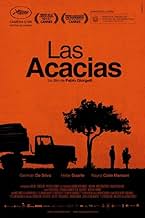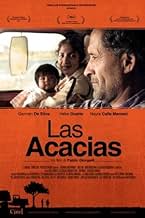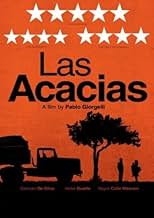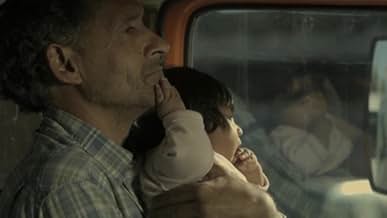AVALIAÇÃO DA IMDb
6,9/10
2,5 mil
SUA AVALIAÇÃO
Um caminhoneiro aceita levar com ele uma mulher e um bebê de Assunção, Paraguai até Buenos Aires, Argentina, mas tenta ignorá-los durante a viagem.Um caminhoneiro aceita levar com ele uma mulher e um bebê de Assunção, Paraguai até Buenos Aires, Argentina, mas tenta ignorá-los durante a viagem.Um caminhoneiro aceita levar com ele uma mulher e um bebê de Assunção, Paraguai até Buenos Aires, Argentina, mas tenta ignorá-los durante a viagem.
- Direção
- Roteiristas
- Artistas
- Prêmios
- 19 vitórias e 22 indicações no total
Germán De Silva
- Rubén
- (as Germán de Silva)
Matilde Jazmín Mamani
- Prima Anahí
- (as Matilde Jazmín Quispe Mamani)
Odón Morán López
- Camionero Paraguayo
- (as Odón Morán Lopez)
Darío Luchetta
- Camionero en asado
- (as Darío Lucchetta)
Yanina López
- Hija dueña parrilla
- (as Yanina Paz López)
- Direção
- Roteiristas
- Elenco e equipe completos
- Produção, bilheteria e muito mais no IMDbPro
Avaliações em destaque
I saw this by mistake on the UK TV channel Film 4. I am generally a fan of the Steven Segal school of movies, so you may be surprised that I found this film so powerful and enjoyable at a deep level. As other reviewers have written, very little happens. A lorry driver takes a mother and her baby daughter across Argentina and that's about it! This film is like a flower unfolding, you can't see anything happen but at the end there is something wonderful and beautiful that was not there before. The director was very brave and allows the film to drive itself rather than be driven by any need to pander to external pressures. It rings so true. I am a bit like Ruben the driver, unable to express what is in his heart, which made it a film that I identify with in a way I rarely do. The baby is brilliant! Give this film a chance, it will richly reward you!
Since its inception in the 1960s, the road movie genre has always represented adventure, debauchery and freedom. One is put in mind of Bonnie and Clyde charging along an open road leaving bodies and bank vaults in their wake, or Wyatt and Billy in Dennis Hopper's Easy Rider blowing joint smoke in the face of conformity.
Argentinean director Pablo Giorgelli's debut feature Las Acacias embodies none of these conventions, but it is a road movie in the most essential sense of the phrase. It is a story about driving from point A to point B: middle-aged truck driver Rubén (Germán de Silva) has been asked by his boss to transport single mother Jacinta (Hebe Duarte) and her five-month-old daughter Anahí (Nayra Calle Mamani) to her cousin's house in Buenos Aires, where she hopes to find work. Other than the occasional stop to refuel and have dinner, it is a full 85 minutes of Rubén just getting on with the job.
In the film's opening half hour we are constantly taunted with the possibility of conventional drama, yet it is dismissed at every turn. Going on Rubén's gruff demeanour, one assumes this may be a slightly dodgy arrangement, in which Jacinta has paid Rubén's boss to help her get out of the country. However, it turns out to be pretty much above board. When they are stopped at the border, one expects them to spout a web of lies to keep the shady truth from the inspectors, but in fact they merely explain themselves sincerely and are let through without any hassle. Similarly, the mystery surrounding Jacinta and Anahí, who she insists 'has no father', is never really explored. At one point, Ruben sees Jacinta crying, but instead of asking her what's wrong and give her the chance to tell her story, he walks away.
After a while you're forced to confront the fact that the film isn't going to diverge at all from the straightforward route it set out to take. At the Sunday morning 'OAPs get in free' screening that I attended, a good few of the older patrons eventually gave up and walked out, unable to bear the boredom anymore and free from the desire to get their money's worth. Yet as gruellingly tedious as Las Acacias can be, if you persist you're gifted with a touching and surprisingly unique film experience.
Unlike the road movie heroes of old, who took to the highway in search of adventure, driving is Ruben's profession and it isolates him from the rest of the world. Constantly hauling lumber from one place to the next, he is deprived of any human contact, and at the beginning he sees Jacinta and Anahí as a mere inconvenience. But in spite of Rubén's detachment and Jacinta's 'I've been hurt before' timidity, the two begin to bond. While the premise is admittedly a little corny, their relationship unfolds in a completely natural way, emanating out of brief conversations and fleeting glances. Of course, this is all far from exciting, but Giorgelli's pared-down style brings a reality and poignancy to the narrative, which is in itself rather captivating.
The most diligent viewer should be forgiven for phasing out from time to time, but boredom seems to be an essential reaction which the film seeks to invoke. Forced to spend an hour-and-a-half imprisoned in Rubén's truck, we become like another passenger, and while your eyes may occasionally wander or you may even nod off, you nevertheless find yourself engrossed in their journey. The film builds softly to a bittersweet ending and having been so closely subjected to this would-be courtship yourself, it is all the more heartrending.
Las Acacias is a road movie about as exciting as a long commute. Nothing really happens and even less is said. But within its static, self- contained world, something pretty remarkable takes place.
Argentinean director Pablo Giorgelli's debut feature Las Acacias embodies none of these conventions, but it is a road movie in the most essential sense of the phrase. It is a story about driving from point A to point B: middle-aged truck driver Rubén (Germán de Silva) has been asked by his boss to transport single mother Jacinta (Hebe Duarte) and her five-month-old daughter Anahí (Nayra Calle Mamani) to her cousin's house in Buenos Aires, where she hopes to find work. Other than the occasional stop to refuel and have dinner, it is a full 85 minutes of Rubén just getting on with the job.
In the film's opening half hour we are constantly taunted with the possibility of conventional drama, yet it is dismissed at every turn. Going on Rubén's gruff demeanour, one assumes this may be a slightly dodgy arrangement, in which Jacinta has paid Rubén's boss to help her get out of the country. However, it turns out to be pretty much above board. When they are stopped at the border, one expects them to spout a web of lies to keep the shady truth from the inspectors, but in fact they merely explain themselves sincerely and are let through without any hassle. Similarly, the mystery surrounding Jacinta and Anahí, who she insists 'has no father', is never really explored. At one point, Ruben sees Jacinta crying, but instead of asking her what's wrong and give her the chance to tell her story, he walks away.
After a while you're forced to confront the fact that the film isn't going to diverge at all from the straightforward route it set out to take. At the Sunday morning 'OAPs get in free' screening that I attended, a good few of the older patrons eventually gave up and walked out, unable to bear the boredom anymore and free from the desire to get their money's worth. Yet as gruellingly tedious as Las Acacias can be, if you persist you're gifted with a touching and surprisingly unique film experience.
Unlike the road movie heroes of old, who took to the highway in search of adventure, driving is Ruben's profession and it isolates him from the rest of the world. Constantly hauling lumber from one place to the next, he is deprived of any human contact, and at the beginning he sees Jacinta and Anahí as a mere inconvenience. But in spite of Rubén's detachment and Jacinta's 'I've been hurt before' timidity, the two begin to bond. While the premise is admittedly a little corny, their relationship unfolds in a completely natural way, emanating out of brief conversations and fleeting glances. Of course, this is all far from exciting, but Giorgelli's pared-down style brings a reality and poignancy to the narrative, which is in itself rather captivating.
The most diligent viewer should be forgiven for phasing out from time to time, but boredom seems to be an essential reaction which the film seeks to invoke. Forced to spend an hour-and-a-half imprisoned in Rubén's truck, we become like another passenger, and while your eyes may occasionally wander or you may even nod off, you nevertheless find yourself engrossed in their journey. The film builds softly to a bittersweet ending and having been so closely subjected to this would-be courtship yourself, it is all the more heartrending.
Las Acacias is a road movie about as exciting as a long commute. Nothing really happens and even less is said. But within its static, self- contained world, something pretty remarkable takes place.
You don't know what they're thinking, you don't know how they're feeling, you can only guess. That's what makes this film intriguing and gives a "real life" feel to it. There is no background intrusive music, just the hum of a timber lorry lumbering (!) on the highway to Buenos Aires with its human cargo of man, woman and baby. One of the adults seems to have a lonely life without a family, the other one is part of a large and loving family, but there are hints of problems in their backgrounds. By journey's end you are hoping that all three will share a happy future together. By the way, there's no violence and only one brief bit of swearing.
A visual narrative on ordinary folk with a simple but instantly recognisable theme - loneliness. Argentina of late has produced some magical road films featuring the lives of everyday characters - and they are all a joy to watch. It matters not that the dialogue, what little there is of it, is in Spanish. It could be a silent film or dubbed in Arabic. The film speaks for itself. It is so well crafted. A roughneck lorry driver who has travelled the highways of Argentina for 30 years and used to his own space, is ordered by his boss to take one of his journeys south to Buenos Aries with a passenger - a young mother and child. Gradually, as the journey progresses and he becomes more and more frustrated with the noise and demands of the child, but a bond slowly comes through. This is a very touching film and very well made. The open road is shown not as dramatic backdrop in panorama - but as a close-up with each of the characters in the shot. There are a number of comments made by reviewers here that liken the film to watching paint dry etc. I think these people went to the cinema expecting another Die Hard, Steven Seagal, Van Damme, Terminator shoot em up Hollywood rubbish. Suggest that in future they read the poster before venturing further.
Cinema isn't just there to entertain (or make money) it is also to educate and generate thought. Well recommended piece of social realism.
Cinema isn't just there to entertain (or make money) it is also to educate and generate thought. Well recommended piece of social realism.
In Paolo Giorgelli's quiet film 'Las Acacias', not a lot happens. A truck driver with a load of wood (hence the title) gives a lift, somewhat reluctantly, to a woman with a child. They don't talk a lot, but they're both lonely; by the end of the movie, they decide they'd like to see each other again. And that's it. The film covers a journey of 800 miles through South America, but there are no stunning landscapes on view: just a lot of scenes of two people sitting quietly in a cab. And yet, almost strangely, it doesn't drag: there's a feeling of truthfulness that compensates for the absence of action. In spite of being almost unremarkable by design, it's understated quality tells in the end.
Você sabia?
- CuriosidadesFilmed in five weeks between Paraguay and Buenos Aires.
- ConexõesFeatured in The Smallest Red Carpet, But the Biggest Heart (2011)
Principais escolhas
Faça login para avaliar e ver a lista de recomendações personalizadas
Detalhes
Bilheteria
- Faturamento bruto nos EUA e Canadá
- US$ 6.000
- Fim de semana de estreia nos EUA e Canadá
- US$ 6.000
- 9 de set. de 2012
- Faturamento bruto mundial
- US$ 355.979
- Tempo de duração1 hora 22 minutos
- Mixagem de som
- Proporção
- 1.85 : 1
Contribua para esta página
Sugerir uma alteração ou adicionar conteúdo ausente

Principal brecha
By what name was Las acacias (2011) officially released in India in English?
Responda



















